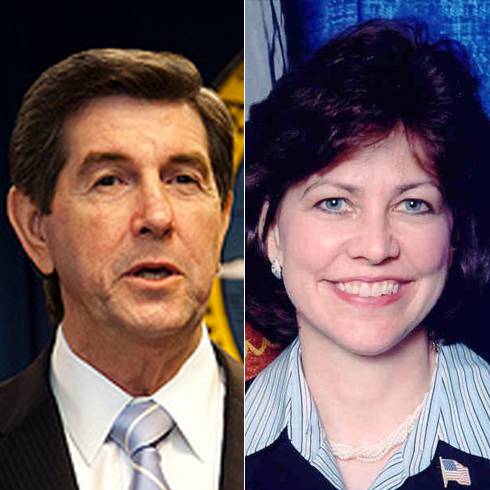OK, this is one of those stories where there’s just so much potential muck that no one comes out looking too good…
The Justice Department is investigating credible allegations that an Alabama lobbyist tried to bribe lawmakers for their votes on a recent high-profile state bill. But the prosecutorial team — which includes several members of the group that ran the controversial Don Siegelman case as well as the Justice Department lawyer who’s under investigation for misconduct in the Ted Stevens case — is being accused of conducting a politically motivated prosecution on behalf of the state’s Republican governor.
Let’s start with the first-order muck:
As we’ve reported, the Alabama Senate last week passed a bill that would move toward legalizing electronic bingo — a major political issue in the state. Two days later, federal prosecutors from the local US attorney’s office and the Justice Department’s Public Integrity unit held a meeting with legislative leaders, where they revealed that they were probing whether senators had been bribed for their votes. One senator, Republican Paul Sanford, told reporters about a conversation he said he had last year with Jarrod Massey, a lobbyist for bingo interests. “He said he had two clients that were each willing to write me a check for $125,000,” said Stanford, of Massey. “Then he said, ‘Of course, there’s no quid pro quo, but they need to know where you stand,’ ” According to Stanford, Massey added: “The guys I represent could fund your campaign two or three times over.”
Sounds mucky enough. But the plot thickens:
The U.S. attorney on the case, Leura Canary, is a close political ally of Gov. Bob Riley, a Republican, who has been on a crusade against electronic bingo, and has strongly opposed the bill currently under consideration. Earlier this decade, Riley appointed Canary to an Indian gambling commission. Indeed, you might remember Canary’s ties to Riley from the prosecution of former governor Don Siegelman. In that case, Canary was ultimately forced to recuse herself because her husband, a top GOP political operative and Karl Rove associate, had run Riley’s successful 2002 campaign for governor against Siegelman, a Democrat. Numerous independent observers have raised serious questions about the impartiality and integrity of the Siegelman prosecution. And in addition to Canary, several other federal prosecutors from her office who worked in the Siegelman case — including her top deputy, Louis Franklin — also are now involved in the bingo investigation.
A spokesman for Country Crossing pulled no punches in telling the Birmingham News what he thinks this all adds up to. “There is no doubt the governor is behind this investigation and is trying to kill this bill” — an accusation that Riley called “silly.”
Massey’s lawyer has submitted a formal complaint to the Justice Department’s internal ethics office, citing Canary’s “close political ties” to Riley and tasking that the investigation be taken away from her office. In a further effort to link the governor to the probe, the complaint noted a state investigator who’s a member of an anti-bingo task force created by Riley is also working on the inquiry. Separately, a lawyer for the Democratic legislators has sent his own letter to the Justice Department, charging that the prosecutors’ disclosure of the probe’s existence in last week’s meeting — an unorthodox move, it seems clear — was designed to creative negative publicity around the bingo bill in order to discourage members of the House from supporting it. “There does not appear to be any legitimate law enforcement function in making such a disclosure at this particular time,” wrote the lawyer, Doug Jones.
Indeed, some observers are suggesting that the prosecutors leaked word of their investigation to the press. As one Alabama blogger has noted, last week a Birmingham News columnist who is supportive of Reilly wrote a column titled “Corruption is Public Enemy No. 1,” without offering specifics as to what he was referring to. The next day, prosecutors revealed the probe’s existence to lawmakers — who quickly went public with the news.
Still, it’s not just Canary’s office that’s handling the investigation. It has had help from the Justice Department’s Public Integrity unit — who presumably have little incentive to do the bidding of Bob Riley. But even that fact doesn’t inspire complete confidence. The lead Public Integrity lawyer on the case is Brenda Morris, who led the team of prosecutors that botched the case of former Alaska senator Ted Stevens, after it was found that they had withheld key evidence from defense lawyers. Morris and five other one-time Public Integrity lawyers are currently themselves the subjects of an investigation into possible contempt charges in connection with that misconduct. Meanwhile, Public Integrity remains without a strong leader. After the collapse of the Stevens case, the unit’s chief, William Welch, left the office, and his permanent replacement has not yet begun. That’s led some observers to wonder whether the US attorney’s office has been able to take advantage of the weakness at main DOJ by bringing in Public Integrity prosecutors to give an essentially political investigation an unmerited stamp of independence and impartiality.
That may go too far. Right now there are still more questions than answers right now. But the layers of potential muck are certainly starting to pile up.









